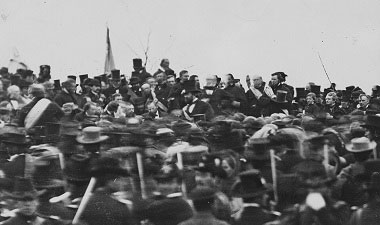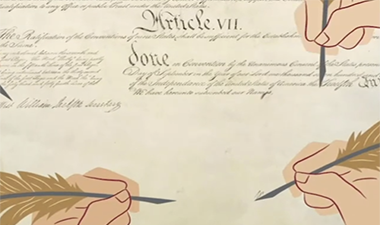
By Robert P. George McCormick Professor of Jurisprudence, Director, James Madison Program, Princeton University
Robert P. George writes that the preservation and protection of liberty is at the core of our nation’s promise, but how we understand the normative content of liberty matters greatly.
One of the most influential lectures in modern political philosophy was delivered in 1958 at the University of Oxford by Sir Isaiah Berlin. In “Two Concepts of Liberty,” Berlin distinguished two understandings or types of freedom: “negative liberty” and “positive liberty.” Negative liberty, Berlin said, is simply the ability to act “unobstructed” by external forces of coercion (e.g., by government). Positive liberty, by contrast, is the person’s reasoned exercise of freedom oriented towards rationally desirable ends.
An example of negative liberty is the freedom to speak without fear of being punished for what one says. An example of positive liberty is the use of that freedom to speak what one knows or at least sincerely believes to be the truth. Another example of negative liberty is the freedom to practice one’s religion, or practice no religion, free of coercion. Another example of positive liberty is the use of that freedom to honestly and sincerely raise and, as best one can, answer religious questions, and to lead one’s life with authenticity and integrity in line with one’s best judgments. Negative liberty might allow a person to be a slave to no man or no government, but it would not necessarily prevent him from being enslaved to his own passions or sub-rational impulses.
The authors of our Declaration of Independence considered liberty and its upright exercise in pursuit of the flourishing of themselves, their families, and their communities—what they famously termed the “pursuit of happiness”—to be an unalienable right, one that is bestowed upon every human being by God (“endowed by their Creator”) and which therefore cannot justly be taken away or violated by any merely human power. Indeed, this concept of liberty is intimately associated with the American Revolution and reflects our forefathers’ intentions in crafting the American constitutional order—from Patrick Henry’s famous declaration “Give me liberty or give me death!” at the Second Virginia Convention to the demand for the addition to the Constitution of a Bill of Rights explicitly guaranteeing specific freedoms, lest the Constitution’s provisions fail adequately to protect individual liberty.
There is no doubt that the preservation and protection of liberty is at the core of our nation’s promise. Indeed, we take for granted that our Founders fashioned America’s civic institutions and constitutional structures with the aim of guaranteeing liberty. But it matters—both as a matter of refined and accurate historical understanding and as applied in practical political contexts (such as courts attempting to discern the meaning of constitutional provisions, such as those of our Bill of Rights) how we understand the normative content of liberty.
Was it purely negative liberty, understood as freedom from coercion and constraints and detached from the realization of substantive goods or ends? Or was our constitutional order designed to protect and advance a richer conception of liberty—that liberty which consists of persons freely engaging in the pursuit of self-mastery and the cultivation of authentic human goods?
My own view is that the concept of liberty articulated at the American Founding is properly understood as more than mere freedom from coercion. It is freedom for, and not just freedom from. The freedom it is for is freedom for virtue—for living good and honorable lives. For the Founders, the “pursuit of happiness” did not mean doing what one pleases, whatever one pleases, be it morally right or wrong. By “happiness” they did not mean a gratification of one’s desires, whatever they happen to be, or a pleasant psychological or mental state. On the contrary, by “happiness” they meant felicity—all round well-being, integral fulfillment, flourishing.
The Founders celebrated liberty, to be sure, but distinguished it from license (i.e., what we might call the morally wrongful use of freedom, or the abuse of freedom). They did not treat what Berlin called negative liberty as an end in itself; rather, they viewed liberty as a condition for the pursuit of worthy ends. Indeed, our Founders hoped—and, in a certain sense, bet—that the moral sensibilities of the American people would prevent the individual liberty protected under our constitutional order from being abused to perpetuate gross immorality and fundamental injustices. John Adams famously explained that the system of government constructed by the Founders was not “armed with Power capable of contending with human Passions unbridled by morality and Religion.” Our Constitution, Adams wrote, “was made only for a moral and religious people. It is wholly inadequate for a government of any other.”
The consequences of reading a purely negative conception of liberty into our national charter have been damaging to the bedrock principles of public morality that our Founders’ constitutional vision relied upon. Since the 1960s, jurists have issued landmark decisions interpreting various constitutional provisions in ways that our Founders—who envisioned liberty as necessarily constrained by widely-accepted moral norms and religious values—would have found scandalous. Myriad dubious concepts—from “penumbras, formed by emanations” of amendments in the Bill of Rights to the paradoxical idea of “substantive due process”—have been deployed to read into the Constitution putative rights favored by contemporary partisans of negative liberty, but not honestly derivable from the Constitution’s text, logic, structure, or historical understanding. Such judicial maneuvers have in various areas deprived the people of the states and the nation the right to what political philosopher Michael Sandel calls “civic liberty”: the right of people to be genuine citizens of a democratic republic, where the people play a meaningful role in deciding important questions—such as what is required by way of law and policy for the protection of public health, safety, and morals, and the advancement of the common good.
Even today in contemporary legislative and constitutional debates, some deploy broad notions of “freedom” and “liberty” to further political goals that can only be understood as maximizing personal autonomy in ways that are detached from conceptions of traditional morality and the human good. But under a robust conception of ordered liberty—as ordered towards the realization of valuable ends, worthless when exercised wrongly or immorally, and not functioning as a ‘trump’ to shut down debate and restrict the legitimate role of government in advancing justice and protecting public morality—the ability of political actors to read their own passions and desires into our Founding documents and the intentions of our nation’s Founders is limited.
I do not dispute that our Founders considered America’s promise of liberty as providing protections to error—or, at least, protections to individuals who proclaim error in speech, the press, assemblies, or from the pulpit. Even so, it would be a mistake to view the concept of liberty central to our nation’s charter as essentially akin to what the influential late 20th century liberal political philosopher John Rawls described as the “principle of basic liberty”—the requirement that “each person is to have an equal right to the most extensive basic liberty compatible with a similar liberty for others.” To put it bluntly, our Founding documents should not be interpreted as a mandate to maximize individual autonomy for its own sake—and nothing in the Founders’ concept of liberty requires that the government do so. Liberty has a purpose, and conditions required for its success; absent recognition of that purpose and the careful cultivation of the societal conditions essential for liberty to be responsibly exercised, our constitutional order as the Founders envisioned it is imperiled.
As we commemorate the Declaration of Independence on its 250th anniversary, it is an appropriate time to reflect on how much a rightly-ordered sense of liberty has contributed to the development of our constitutional order and equal justice in this country. Tarnished by the grave injustice of slavery from our founding, the enduring promise of liberty assisted abolitionists in making the case—a fundamentally moral case—for ending that barbaric practice and establishing legal equality for all, irrespective of race or ethnicity. Liberty shielded religious minorities from faith-based persecution and allowed them to worship according to the dictates of their consciences; when the government overreached—for instance, when in the 1920s Oregon, under pressure from the Ku Klux Klan and other anti-Catholic bigots, targeted parochial education by adopting a statute attempting to require all children to attend public schools—the courts intervened to protect religious liberty and the natural right of parents to direct the upbringing and education of their children. A unanimous Supreme Court ruled in that case, Pierce v. Society of Sisters (1925), that the “fundamental theory of liberty” upon which the American constitutional order rests excludes usurpations of parental authority over children.
Still, we must be vigilant against ongoing attempts to revise or misinterpret the concept of liberty enshrined in the Declaration of Independence. Such efforts may suit certain contemporary sensibilities, but they cut against the authentic meaning of liberty that our Founders would have recognized—and that provides our constitutional order with crucial moral fiber. Our nation’s promise is not that government will prescind from making moral judgments or acting politically upon moral truths under the vague and shapeshifting banner of “liberty.” It is, rather, that ordered liberty is an essential condition for the flourishing of republican government and the ability of people to pursue their flourishing and the flourishing of their families and broader communities. This is the pursuit of happiness that the Declaration proclaims: not happiness in the emotivist sense of pleasant feelings and sensations, but happiness as the felicity—the fulfillment—we human beings can attain by acting virtuously for the sake of worthy ends.
Robert P. George is McCormick Professor of Jurisprudence. Director, James Madison Program, Princeton University.







